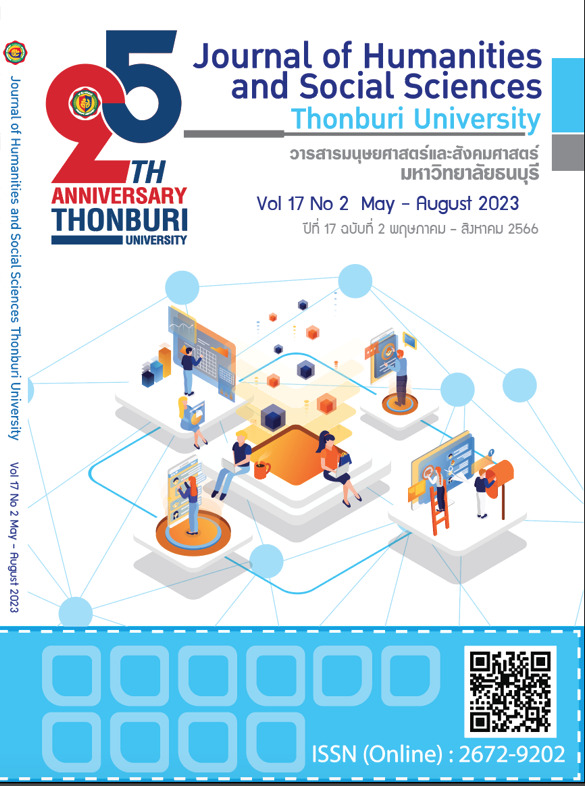Transition toward a sustainable digital university based on the conceptual framework of “European Foundation for Quality Management” (EFQM)
Keywords:
Sustainable digital university, EFQM, Transition, Enabler factors, Result factorsAbstract
In order to be able to adapt and keep pace with the dynamic changes in the digital era. One of the important and urgent missions of every university/ higher education institution is to strive toward a sustainable digital university. From academic point of view, no previous academic study has proposed a holistic framework to drive such a mission to success. Thus, this paper aims to bridge the gap by proposing a conceptual framework based on “European Foundation for Quality Management” (EFQM) to transition universities toward sustainable digital universities. EFQM has been wildly accepted as a systematic framework that drives an organization toward excellence. EFQM divides success factors into 3 factors including “enabler factors”, “result factors” and “learning and innovation factors”. Enabler factors comprise of 5 components as “leadership”, “strategy”, “people”, “partnerships and resources” and “process management”. While, the results factors comprise of 4 dimensions as “people dimension”, “customer dimension”, “society dimension”, and “business dimension”. Lastly, “learning and innovation factors” are factors that stimulate the driving mechanism towards sustainability. The article provides academic value by proposing ways to put this conceptual framework into practice in order to drive the university towards a successful transition to a sustainable digital university.
References
วิจารณ์ พานิช. (2558). วิถีสร้างการเรียนรู้เพื่อศิษย์ ในศตวรรษที่ 21. วารสารนวัตกรรมการเรียนรู้, 1(2), 3-14.
Al Tabaa, O., Gadd, K., & Ankrah, S. (2013). Excellence models in the non-profit context: strategies for continuous improvement. International Journal of Quality & Reliability Management, 30(5), 590-612.
Bisogno, M., Dumay, J., Manes Rossi, F., & Tartaglia Polcini, P. (2018). Identifying future directions for IC research in education: a literature review. Journal of Intellectual Capital, 19(1), 10-33, doi: 10.1108/JIC-10-2017-0133.
Brusca, I., Cohen, S., Manes-Rossi, F., & Nicolò, G. (2019). Intellectual capital disclosure and academic rankings in european universities: do they go hand in hand?. Meditari Accountancy Research, 28(1), 51-71, doi: 10.1108/MEDAR-01-2019-0432.
Dahlgaard, J.J., Chen, C.K., Jang, J.Y., Banegas, L.A., & Dahlgaard-Park, S.M., (2013). Business excellence models: limitations, reflections and further development. Total Quality Management & Business Excellence, 24(5-6), 519–538.
Dejan, D., Ćoćkalo, D., Bešić, C., & Bogetić, S. (2018). The role of quality in the process of improving competitiveness of domestic economy. International Journal Advanced Quality, 46(1), 21-26.
Dubey, M. (2016). Developing an agile business excellence model for organizational sustainability. Global Business and Organizational Excellence, 35(2), 60-71.
Iacoviello, G., Bruno, E., & Cappiello, A. (2019). A theoretical framework for managing intellectual capital in higher education. International Journal of Educational Management, 33(5), 919-938, doi: 10.1108/IJEM-02-2018-0080.
Mbote, K.M.P., Kiragu, D.N.U., Marwa, S.M., & Theuri, M.M. (2018). Effect of partnerships and collaborations on performance excellence in universities in Kenya. International Journal of Economics, Business and Management Research, 2(2), 547-560.
Oakland, Ã.J.S., & Tanner, S.J. (2008). The relationship between business excellence and performance – an empirical study using Kanji’s leadership excellence model. Total Quality Management, 19(7), 733-749.
Pavel, A. (2018). An investigation of interconnection between business excellence models and corporate sustainability approach. European Journal of Sustainable Development, 7(1), 381-394.
Pfeffer, J., & Salancik, G. (1978). The external control of organizations: A resource dependence perspective. New York: Harper and Row.
Ramadan, B.M., Dahiyat, S.E., Bontis, N. & Al-Dalahmeh, M.A. (2017). Intellectual capital, knowledge management and social capital within the ICT sector in Jordan. Journal of Intellectual Capital, 18(2), 437-462, doi: 10.1108/JIC-06-2016-0067.
Verhoef, P. C., Broekhuizen, T., Bart, Y., Bhattacharya, A., Qi Dong, J., Fabian, N., & Haenlein, M. (2021). Digital transformation: A multidisciplinary reflection and research agenda. Journal of Business Research, 122, 889–901.
Vial, G. (2019). Understanding digital transformation: A review and a research agenda. The Journal of Strategic Information Systems, 28(2), 118–144.
Translated Thai References
Panich, Wijarn. (2015). A way of creating learning for students in the innovation curriculum 21. Journal of Learning Innovations, 1(2), 3-14. (in Thai)
Downloads
Published
How to Cite
Issue
Section
License
Copyright (c) 2023 maliwan phuttara

This work is licensed under a Creative Commons Attribution-NonCommercial-NoDerivatives 4.0 International License.
ผลงานที่ปรากฎในวารสารฉบับนี้เป็นลิขสิทธิ์เฉพาะส่วนบุคคลของผู้เขียนซึ่งต้องรับผิดชอบต่อผลทาง กฎหมายที่อาจเกิดขึ้นได้และไม่มีผลต่อกองบรรณาธิการ






